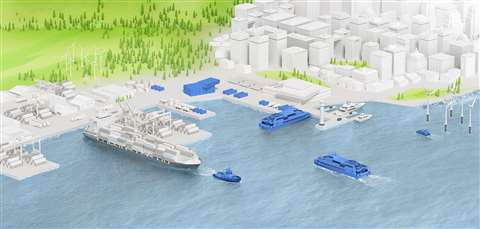Rolls-Royce developing mtu methanol engines for marine applications
22 December 2021
 Rolls-Royce says methanol will play an important role in delivering solutions to make shipping more climate-friendly and ultimately climate neutral
Rolls-Royce says methanol will play an important role in delivering solutions to make shipping more climate-friendly and ultimately climate neutral
Rolls-Royce has revealed that it is working on developing its mtu engines for use with methanol. The new, high-speed four-stroke engines are planned for use with commercial shipping and yachts.
Part of the company’s Net Zero at Power Systems programme, methanol is said to offer a number of advantages when looking to make shipping more climate-friendly – and ultimately climate neutral.
The fuel can be produced in a CO2-neutral power-to-X process, in which CO2 is captured from the air for use in the process.
In addition, methanol has a high energy density in comparison to other sustainable fuels, while the liquid state supports easy storage and delivery at ambient temperatures. In many cases, it can also be delivered using existing infrastructure, unlike hydrogen.
This would result in a lower investment point to realise a methanol production and refuelling infrastructure.
Also, unlike ammonia, which is being explored by other companies as a shipping fuel, the company states that methanol is non-toxic and environmentally safe.
Rolls-Royce also pointed out that the combustion of methanol in a ‘pure methanol engine’ can be climate neutral, with significantly reduced nitrogen oxide emissions. This negates the need for SCR treatment hardware.
Methanol can be used in a series of combustion engine types (Diesel and Otto), but also in combination with emission-free fuel cells. Using a reformer, hydrogen can be produced from methanol, which can then be used in fuel cells to produce electricity. This would be suitable for ships which do not have the space for hydrogen tanks.
Rolls-Royce is planning to introduce the new generation of mtu Series 2000 and 4000 engines for use with sustainable fuels, including synthetic diesel, second-generation biofuels or e-diesel, from 2023. This will support climate-neutral operation across almost all applications.
So-called ‘smart ship solutions’ using semi- and fully-autonomous operation are also expected to help reduce CO2 emissions.
Daniel Chatterjee, director of Technology Management & Regulatory Affairs at Rolls-Royce Power Systems, explained: “On the road to climate neutrality, there will not be one technology and one fuel that is the best solution for all applications. Rather, there will be a coexistence of different propulsion technologies and fuels. Hydrogen, for example, which is converted into energy in a fuel cell or even in a combustion engine, will be as much an issue for us and our customers as e-methanol, e-methane, e-diesel or e-ammonia.”
STAY CONNECTED




Receive the information you need when you need it through our world-leading magazines, newsletters and daily briefings.
POWER SOURCING GUIDE
The trusted reference and buyer’s guide for 83 years
The original “desktop search engine,” guiding nearly 10,000 users in more than 90 countries it is the primary reference for specifications and details on all the components that go into engine systems.
Visit Now
CONNECT WITH THE TEAM










